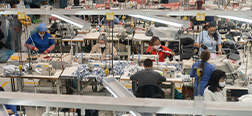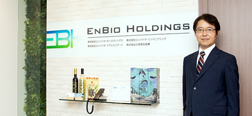Air (Exhaust) Regulation Support in China
Air-related legislation has rapidly tightened in China in recent years, making it one of the major operational risks in the manufacturing industry. EnBio is fully capable of meeting customers’ needs, such as ‘I want to prevent exhaust problems for stable factory operations’ and ‘I have already received information on production restrictions, but I want to do something about them’, to support for air (exhaust) regulations.

Environmental concerns and EnBio’s services
For these customers, we can diagnose your facility’s exhaust treatment capacity and risks based on documents, records and measurement data and then propose solutions, such as management methods and equipment purchases.
Environmental concerns
- How often should we take measures to fight air waste (exhaust from factories)? I would like to know more about the related environmental regulations and administrative guidance.
- Since the beginning of our operations, a small amount of volatile organic compounds (VOCs) have been used in out bonding process. I need you to determine whether our VOC levels are legal or not under the current environmental regulations.
- There is a VOC odour in the factory. I want to improve our VOC levels/use.
- We have received complaints from local residents about a foul-smelling odour coming from our facility. All of our exhaust-monitoring results are correct, so we have not been able to determine the odour’s cause. I want to understand the cause of the bad odour and remove it.
- We would like to obtain a higher level of performance evaluation in our technical guide for emergency emission reduction measures for key industries during times of heavy pollution (revised in 2020) and relax the measures for reducing production during times of heavy pollution.
EnBio's services
- Diagnosis of exhaust status (legal compliance, ledger compliance, unorganised waste / VOCs emission levels and treatment efficiency status, causes of foul odours)
- Exhaust improvement plans (maintaining ledgers, design of containment strategies for unorganised waste, selection and design of necessary exhaust treatment equipment)
- Solution proposals (providing VOC removal with 99% efficiency via exhaust treatment and deodorising equipment)
- Correspondence related to technical guides for emergency emissions reduction measures in key industries during times of heavy pollution (2020 revised edition)
- Measures against unorganised waste, VOCs and foul odours
- 1. Notification of ‘technical guide for emergency emission reduction measures of key industries in heavy polluted weather’ (2020 revised edition)
- Companies are ranked A, B, C or D, according to their VOC emission control status. When fall and winter air regulations are in effect, Class A companies take voluntary reduction measures, and Class D companies stop their production lines, even during the yellow warning period. Production regulations and peak shift production guidance during times of higher air pollution will become stricter. Reducing VOC emissions will be an important issue for companies that wish to continue operating during fall and winter air regulation periods.
- 2. Limiting VOCs in adhesives (compulsory standard, enforced in December 2020)
- The upper permissible VOC content for adhesives is compulsorily standardised, and only adhesives that meet these standards mays be used. This will lead to the tightening of regulations in the Air Pollution Control Law.
- 3. Standard for fugitive emissions of VOCs (fully enforced in July 2020)
- Tighter regulations have been imposed on VOCs from non-organised exhaust (exhaust leaking from sources other than chimneys) released by factories. Reducing VOC emissions can be achieved by containing VOCs’ non-organised exhaust gas, creating VOC management ledgers and improving exhaust treatment equipment.
Efforts to move to a higher corporate category (A, B, C or D)
Through EnBio's support for China's air (exhaust) regulations, it is possible not only to take the minimum measures to avoid sudden shutdowns, but also to move to a higher corporate category (A, B, C or D).

For customers who place a high priority on dealing with the risk of production restrictions due to exhaust-related regulations (e.g., VOCs and foul odours) and who are considering improving their exhaust treatment equipment, a field survey with sampling, followed by a proposal / the introduction of support for specific equipment improvement, we can offer the following:
-
Arrangement of issues (web support available)
- Sorting out issues (Effects of VOC removal? Foul odour? Unorganised waste? Relaxation of production regulations?)
- Solution (hypothesis) planning
-
Source investigation
- Analysis of target gas, checking for gas type, concentration, temperature, air volume, removal efficiency, malodorous substances, etc.
- Equipment / improvement method preliminary design
-
Field survey (equipment design)
- Consideration of methods for sealing unorganised waste
- On-site confirmation of design constants such as air volume after sealing unorganised waste
-
Effects confirmation testing
- Confirm the effects of removing VOCs and foul odours locally and at the processing equipment manufacturing plant
-
Design
- Design and manufacture processing equipment featuring the minimum required air volume (tailor-made design)
-
Introduce exhaust treatment equipment
- Administrative procedures, installation, test runs, driving operation education and training
Q&A
- Is it possible to relax production restrictions during the fall / winter air regulation periods?
- It is possible. It is also necessary to be certified as a Class A company in the technical guide for emergency emission reduction measures for key industries during times of heavy pollution (2020 revised edition). When taking measures such as installing new exhaust treatment equipment, it is necessary to prepare well in advance, as it may take six months or more to obtain performance certification from the government.
- Regulations on the VOC content of adhesives began in December 2020. Are imported adhesives also regulated?
- The higher-level system, the Air Pollution Control Law, stipulates that imported products that do not meet the new standards are prohibited.
- Is it possible to remove the bad odour?
- It is possible to deodorise the malodour by introducing an exhaust treatment device that uses an adsorbent or catalyst that is suitable for mitigating the malodorous substance.
- Can you identify the reason for the production restrictions?
-
If you have already received some kind of guidance from the government, such as a production restriction, it is often because the cause remains unclear, so corrective action is needed. Working out of our China offices, we can identify the cause of the problem based on the operational status of local laws and regulations, propose specific solutions to the problem and take administrative measures to deregulate after improvement. Support is possible.
We will also organise the current situation of your local corporations from the China office, as it is often difficult for Japanese headquarters to grasp local situations. We understand the level required to be cleared and will be able to respond to your needs at the appropriate level.











